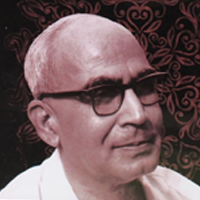Profile of JaiKrishn Chaudhry Habeeb
Pen Name : 'Habeeb'
yād-e-hazīñ nuqūsh-e-karam aur nigāh-e-chand
kyā bāñdhā ham ne raḳht-e-safar kuchh na pūchhiye
yaad-e-hazin nuqush-e-karam aur nigah-e-chand
kya bandha hum ne raKHt-e-safar kuchh na puchhiye
As goes the tradition of listing the prominent figures of language and literature, Jai Krishn Chaudhary is not just the name of a mortal but also that of a grand institution in a man. A noted scholar of Sanskrit, English, Persian and Urdu, he is also regarded widely for his role in independence struggle and administrative services in Free India.
Jai Krishn Chaudhary was born in 1904 in a reputed family of the village of Taank in Dera Ismail Khan. His father Rai Sahib Keval Krishn Chaudhary was an esteemed lawyer and zamindar. He was also known amongst the literati for being well-spoken and possessing a valuable library. It was under the clear guidance of his father that Jai Krishn Chaudhary spent his early years. He was considered a very bright student for having an exceptional academic record. Scoring a first-division in matriculation and intermediate, he went on from obtaining masters in arts from Aligarh to passing LLB examination with flying colors.
He started practicing law in 1929 and soon became a notable figure in the Bar Association. This was a time when the Nationalistic Movement was at its peak and Jai Krishn Chaudhry had been stirred by the ambient nationalistic spirits. He had already participated in the Non Cooperation Movement during the years of his scholarship but his political and administrative fervor became more evident after 1929. Prior to Partition, he played the significant role of the President of Abbottabad Congress Committee. During his presidential years, he was closely involved with Mahatma Gandhi, Jawaharlal Nehru, Maulaana Azad and other key figures of the national movement, working alongside Khan Abdul Gaffar Khan. He migrated to India after the partition in 1947. He later served as the Assistant Regional Commissioner in Rajasthan from 1948 to 1952. In the year 1953, he qualified for the prestigious Indian Administrative Services and became a Collector in 1954. He was then appointed as the Education Secretary. He took an early retirement from services in the year 1960 as the Divisional Commissioner of Riva. Nevertheless, he was recalled to the services and served for three more years as Municipal Commissioner at Jabalpur Corporation before retiring to a life of solitude at ‘Aashiyaan’ in Jabalpur. However, his creative engagements are still as active as ever.
He has authored some highly regarded books like The Gatekeepers of India in English. He also played a prominent role in introducing Kalidas, Bhartrahari, Mira, Abdur Raheem Khan-i-Khana to Urdu academics. His contributions to translation work in Urdu has been aptly deemed as being a dear treasure. He has authored an Urdu divan titled Naghma-e-Zindagi.

